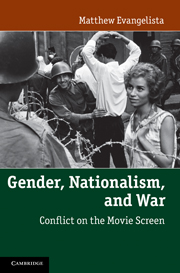Book contents
- Frontmatter
- Contents
- List of figures
- Preface
- 1 Virginia Woolf's purse
- 2 Algeria: a world constructed out of ruins
- 3 Yugoslavia: archetype or anomaly?
- 4 Chechnya: virgins, mothers, and terrorists
- 5 Québec: oui, no, or femme
- 6 “To live to see better times”: gender, nationalism, sovereignty, equality
- Index
- References
5 - Québec: oui, no, or femme
Published online by Cambridge University Press: 05 June 2012
- Frontmatter
- Contents
- List of figures
- Preface
- 1 Virginia Woolf's purse
- 2 Algeria: a world constructed out of ruins
- 3 Yugoslavia: archetype or anomaly?
- 4 Chechnya: virgins, mothers, and terrorists
- 5 Québec: oui, no, or femme
- 6 “To live to see better times”: gender, nationalism, sovereignty, equality
- Index
- References
Summary
I wish the women would hurry up and take over. It's going to happen, so let's get it over with. Then we can finally recognize that women really are the minds, and the force that holds everything together, and men really are gossips and artists. Then we could get about our childish work and they could keep the world going. I really am for the matriarchy.
Leonard Cohen, 1968Québec is a matriarchal society that has adjusted itself to the patriarchal international rules.
Robert Lepage, 1998Bombings, kidnappings, and murder, mass arrests, and the deployment of soldiers and tanks on the streets. These are aspects of Québec nationalism little known outside of Canada. Nor is Nô – the 1998 film by director and playwright Robert Lepage that treats these episodes – as famous as some of the other films discussed in this book. Yet it is an insightful, funny, and award-winning exploration of the links between nationalism, gender, and violence, and one, unlike most of the films considered here, that offers a hopeful message. The separatist impulses that led to the violent events of October 1970 and the forceful response from the Canadian federal government did not portend a spiral of violence or a descent into civil war, as we have seen in so many other cases. Instead, for many years now the struggle over Québec's status within Canada has been waged by peaceful means: by negotiation and referenda.
- Type
- Chapter
- Information
- Gender, Nationalism, and WarConflict on the Movie Screen, pp. 203 - 252Publisher: Cambridge University PressPrint publication year: 2011



